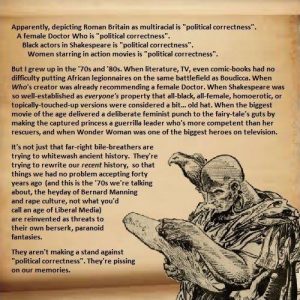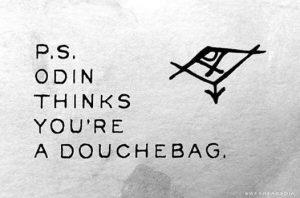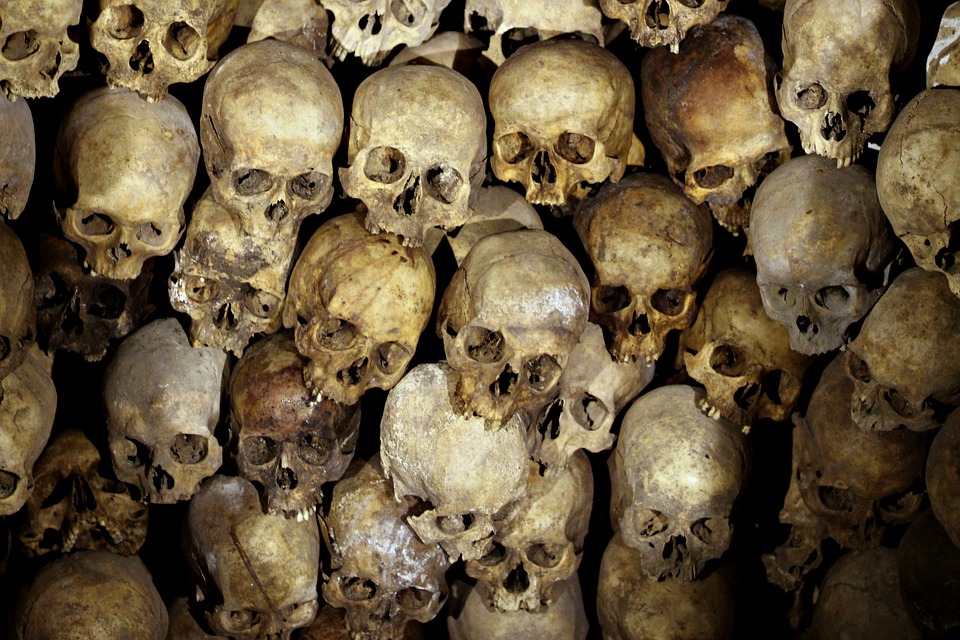Several years ago, I had a dream that people told me couldn’t possibly come true. There was simply no way, it was too unlikely, and though it had left me shaken for the entire day, it was really nothing to worry about.
After all, how likely were pitched battles on the streets between Nazis and non-Nazis? Moreover, the dream had taken place in my hometown and I no longer lived there, right? But dream works differently, what is detail in life is symbol in dream, and I remember that dream all too well after the events of this past weekend. Nazis bearing swastika flags, spewing messages of hate and throwing projectiles, armed and deadly on unwelcoming streets. The harassed sounds of police horses and the clip of boots covering the feet of hastily deployed soldiers.
The sound of rounds being chambered.
And in the background, or maybe superimposed – who knows, dream is like that – was the voice exhorting the masses to rise up for ‘Queen and country’.
My friends had been right, it was highly unlikely back then, and yet it filled me with a sense of horror and dread. I can’t help but notice today, that aside from the police horses and setting in Lancashire, it wasn’t too far off what did happen in Charlottesville, VA. Not that I’m claiming my dream somehow predicted that, I’m not. But I do think it was a warning of what was then a coming wave.
Tea With the Dead
The Dead have always played a role in my life and practice. I grew up in a family that was very nominally Anglican, and not so ‘nominally’ Spiritualist. I grew up with a dad whose family had cut their teeth in Spiritualism in post (and presumably during) wartime London. Though I never knew either of my grandmothers and only one of my grandfathers, I had the benefit of a great uncle who still lived down in London, and whom I would go visit with my father as a kid.
My uncle Lew and auntie Ada were incredible people, always laughing, and they could drink enough tea to sink a ship. Like the rest of my father’s family, they’d also spent a lot of time around the Spiritualist circles, and that sense of otherness was palpable in their home. There was nothing threatening there, but I never quite felt like I was alone even when there was no one else around. Our visits there were mostly spent laughing over countless cups of tea – I loved them dearly.
But uncle Lew and auntie Ada also had stories to tell, and some of them were quite dark. You see, they’d been of an age to be around for WWII, and as Londoners -or more specifically Cockneys -they’d experienced the very worst of the Blitz.
Amazingly, most of their stories about this era were told with humor. They told stories of a world on fire in which no one knew if they would survive or not, and so they’d decided to enjoy what they could anyway for the most part. They were a people who had learned to dance on the knife’s edge, living as though every day was their last. And all of that might have sounded like bravado but for the heavy shadow that fell upon some of their words, that though delivered in such a matter of fact manner, had all the impact of a gut punch.
I often think about what they’d think had they lived to see the days we live in now. Would they recognize in us the same descent they experienced? Did the Dead scream in warning as loudly to them in the build-up to the war as they do to some of us now? Are we on the path to similar or worse?
The Use and Abuse of History
“He who controls the past controls the future. He who controls the present controls the past.” George Orwell, 1984
As I’ve written previously, to know the past is to be able to predict the future. Divination in the Heathen period played many roles, but it was never about getting a set answer about what was going to happen next. It was for  discerning the will of the gods (and perhaps receiving a heads up from them about the future), for finding that which was lost, and for discovering past and present events that were not yet known to the enquirer. To know what was past and what was yet unseen was to be able to have a greater chance of predicting the future.
discerning the will of the gods (and perhaps receiving a heads up from them about the future), for finding that which was lost, and for discovering past and present events that were not yet known to the enquirer. To know what was past and what was yet unseen was to be able to have a greater chance of predicting the future.
But what if you do not like what the past holds, or the world around you promises? What if none of that fits the model that you would like to see become dominant in the world?
Then you smash the statues, you break that link, and you harass anyone who presents evidence that contradicts that. Oh you claim to care while making those appeals to history/tradition/authority/science (all often incorrectly), but ultimately the people who would go down this route have no real respect for any of it. They simply recognize the truth that George Orwell expressed so succinctly in the quote above.
“He who controls the past controls the future. He who controls the present controls the past.”
This is why history, and perhaps to a lesser degree, memory matters. History shows us the patterns that are best off never repeated again, and a memory that is clear and true is the best protection against the hazards of the Overton Window.
One of the names I go by online is that of “Seo Helrune”, an Old English term that Pollington translates as meaning ‘one skilled in the mysteries of the world of the dead’ (Pollington 51). Though we do not know much about the actual magical tech employed by a Heathen period Helrune, this term still feels fitting for me. From the family I was born into, the kind of magical practice I do, and the history I voraciously devour, the dead and their world have always been a part of me. As strange as it sounds, I find a form of holiness in history; for not only is it in a sense the ‘world’ of the dead, but I believe it also contains the keys to creating a better future for my descendants. Put a pin in that thought though for now, I’ll return to this idea later.
To Conscript a God
Unfortunately, the dead and their world are not the only powers to have been pressed into service for the traditionalist cause – the gods have also fallen victim.
Or rather one god in particular has, and it does not go unnoticed that he is a god associated with the dead and the mysteries of their world.
”Sometimes even he called the dead out of the earth, or set himself beside the burial-mounds; whence he was called the ghost-sovereign, and lord of the mounds.”
(Ynglinga 7)
Again the theme and story repeats.
The god of course, is Odin/Woden/Wotan, and he now finds himself figurehead of a very 21st century phenomenon, the ‘meme war’. What a demotion! From having one’s names on the lips of actual warriors and kings, to being the figurehead of a fucking meme war comprised of keyboard warriors and internet personalities.
However his role does not end with ‘figurehead’, but he also fulfils the role of sacrificial victim too – sacrificed at the altar of ‘the white race’, or ‘folk’.
Consider these words:
”Now, I happen to have been a follower of Wotan, under his name of Odin, for some 45 years, and my personal experience is that He is utterly real, if inherently mysterious. But I don’t expect my Christian, or Atheist, or Agnostic, or Other friends to agree on that. Instead, I invite them to think of Wotan as Carl Jung, the famous psychologist, did: Namely, as an inherited symbol in the collective unconscious of the Germanic Peoples. Either way, as God or as Archetype, Wotan is a source of immense power, and we need to call upon that power to stir the European Peoples into action.” (From: here)
The only ‘god’ here that this worldview has room for is race, like a friend of mine says, My religion is gifting, theirs is white people.
And while I know that historically leaders and kings sought the favor of deities in their various campaigns, the difference is that they did not use them as tools in quite the same way. The rituals were expressions of do ut des as opposed to PR (though PR almost certainly played a part, as it does with any savvy leader), and they knew how to gift.

http://www.magodjinn.com/stickers.html#psodin
The Ancestors Bring Blessings
Modern people, at least in our society, have a problem with death. We do not like to be reminded of it, it is taboo. The majority of us no longer lay out our own dead, or even see anything other than a sanitized version of death when we do. An entire industry exists to relieve us of those final duties to our kin, and it is an industry that has become adept at occulting death from society in general.
All of which I believe helps to draw a big, funerary black curtain between the dead and ourselves in terms how we understand our ancestors.
Don’t get me wrong, we do very well with remembrance, but it can be quite a surprise to us that our Heathen and Pagan ancestors didn’t just engage in rites to the Dead for the sake of remembrance, but for tangible gains too.
“it should be noted that the ancestors, as part of their ongoing concern for their descendants, are thought to bring blessings to family, flock, and field. This is why the Hunt was believed to be propitious, and why people welcomed it despite the chaos and even danger that came with it, an attitude as Höfler, Meuli, Wolfram, and others have amply attested. The *koryos brings increase for the same reason it brings order: because it makes the ancestors present among their people. And so, while the fertility aspects of the cult became all-important, after the conversion, among the country people who kept up these practices, they were always present.” (Kershaw 34)
Presumably what must be propitiated may also be offended, and consequences reaped.
”Three features, writes Meuli, govern the primitive’s conception of the dead person: He continues to live. He is powerful. He is at once well-disposed and malicious (Meuli 1975: I, 303).” (Kershaw 23-24)
Over the past few days, I’ve seen lots of people declare the deeds of their ancestors. Stories of participation in D-Day or at Dunkirk. Stories of liberation and blood, of freeing holocaust survivors and the long deep hatred of Nazis that permeated the words and minds of our more recent ancestors. Are we to think that the rise of this ideology once more, though touting the cause of ancestors would somehow be acceptable to those of our lines who fought those battles?
I suppose it all depends on your ancestors, but I know what mine would think. Tea and memories in a small house in a London suburb have seen to that.
The rhetoric of the far right is often framed in terms of survival of ‘the white race’. We see that ideology condensed into fourteen infamous words:
”We must secure the existence of our people and a future for white children.”
(Source: Wikipedia)
As one might expect in a movement with ideology such as this, women are both exalted as bearers of the future generation and excoriated for not having bred enough. The obsession with the womb, that long-time obsession of those who would exert a far greater degree of social control than any of us should be comfortable with, is a key feature here.
One would almost think that were they truly representing the will of the Holy Powers, that the ‘white race’ would be experiencing a fertility boom, right? (Well you know, if those lazy white women would just accept their role as childbearers…)
As much as I hate to be *that* person pointing this out though, perhaps that is simply not the case?
Sources
Kris Kershaw – The One Eyed God: Odin and the (Indo-) Germanic Männerbünde
Stephen Pollington – Leechcraft

